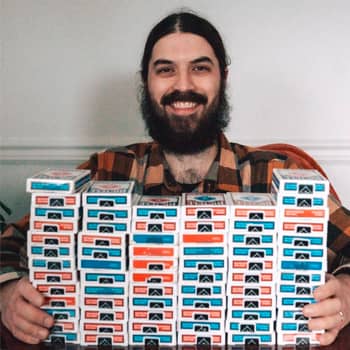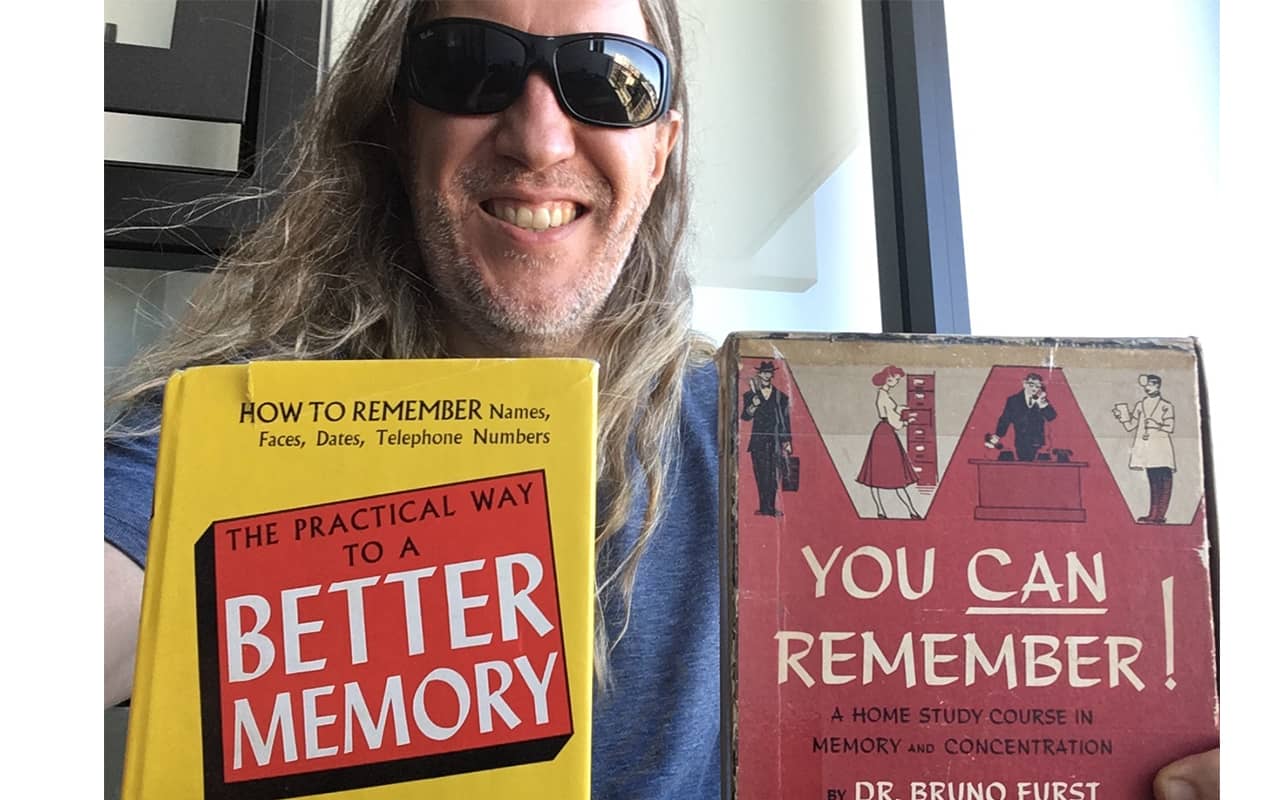Podcast: Download
Subscribe: Apple Podcasts | RSS
 If you’d like to become a mnemonist, or a person who excels at using memory techniques, it’s actually pretty easy.
If you’d like to become a mnemonist, or a person who excels at using memory techniques, it’s actually pretty easy.
Or at least, it can be if you follow the right steps based on the right goals.
What exactly are those goals and what steps do you need to follow in order to become a memory expert capable of demonstrating how memory techniques work?
That’s exactly what we’re going to cover in this post.
I’m a memory expert and mnemonist myself. But I won’t just be using my own examples.
I’ll share with you the stories of many other mnemonists as well.
That way, you can compare and contrast the different mnemonic styles you can pursue.
Along the way, you’ll also discover how to memorize a large amount of information.
Ready?
Let’s get started!
What Is A “Mnemonist”?
The term mnemonist is related to the word “mnemonic,” which means “memory technique.”
This means that a mnemonist is essentially someone who is skilled with using memory techniques.
The term may also refer to a person who:
- Gives memory demonstrations (like Harry Kahne)
- Teaches memory techniques
- Does a combination of both
There’s a bit of a grey area here because sometimes people think that people with superior autobiographical memory, synesthesia are also mnemonists.
For example, there are people like Solomon Shereshevsky or Daniel Tammett where autism may be involved. In each of these cases, it seems clear that these people used mnemonics or something very close to mnemonics when memorizing vast amounts of information.
(Shereshesky’s story is particular interesting, and here’s my full profile if you want to learn more about him.)
Kim Peek does not appear to have used mnemonics, but the mental calculator Sal Piacente has successfully reproduced many of Peek’s talents.
You may also encounter people like Jill Price. She’s associated with photographic memory, but technically has hyperthymestic syndrome. One of the first studies was based on Jill Price’s case, and this condition is not to be confused with eidetic memory.
In sum, a mnemonist has developed a skill. Virtually anyone who wants to have this skill can train for it.
How to Become a Mnemonist and Unlock Your Memory’s True Potential
Once you’ve decided to become a mnemonist, your path is mostly straight forward.
Let’s have a look and pick up some specific examples along the way. Note that some of these steps are in a logical order. But others can be started any time, such as making friends in the memory community.
One: Decide To Be All In
When memory expert and mnemonist Harry Lorayne decided to master his memory, it was to escape punishment.
In order to do it, he went to the library and devoted himself to figuring out what mnemonic devices are and how to use them.
When I say “be all in,” I don’t just mean read a lot of books on Memory Palaces.
I also mean devote yourself to practicing the techniques with a wide variety of information types:
- Vocabulary
- Names
- Numbers
- Symbols
- Playing cards
By doing this, you’ll start to deeply understand more about what memory really is and how you can make it work better on demand.
Two: Start Simply
That said, you have to start somewhere. And for most us, we’ll need to start with a simple goal.
A first goal is to learn how to memorize a list. You can do this using the pegword method, or a use an even a simpler number-rhyme system.
Three: Make Friends In The Memory Community
Given the many stages of learning, it’s useful to be able to speak with others who are both behind and ahead of you.

Marno Hermann broke a record in his country for reciting pi.
And Jesse Villalobos got a raise and a promotion.
There are so many examples like this, and the best part is that most of these people are happy to share their experiences and the specific memory hacks they’ve explored.
Four: Learn More Advanced Mnemonic Techniques
Once you’ve mastered the basic techniques, it’s time to keep developing your skills.
Now, exactly what counts as an “advanced” memory technique is admittedly subjective. But in general, number rhyme systems and alphabet mnemonics are simple compared with tactics like using a 00-99 PAO System based on the Major Method are more advanced.
At this stage, it’s possible to get stuck with decision anxiety because instead of the Major Method, you could choose the Dominic System.
Other times, people cause issues for themselves by using Anki to learn the more advanced systems. But that’s really evading the skill you’re trying to build by confusing mnemonic spaced repetition with rote learning.
Journaling and mindmapping to test if you really want to be a mnemonist can help resolve such issues, and ultimately you want to know about both options, even if you only use one.
Five: Increase The Complexity Of Your Goals
As you continue using memory techniques, you’ll likely find that you plateau. In other words, you get pretty good and then your growth comes to a stand still.
2x USA Memory Champion John Graham has a great suggestion: adding distractions. You can practice memorizing pi with loud heavy metal playing, for example.
Or, you can keep yourself challenged by:
- Exploring new topics
- Becoming a trivia master
- Memorizing mantras as part of a concentration meditation program
- Applying mnemonics to learning a language
- Giving memory demonstrations
One person who gives very interesting memory demonstrations is Nelson Dellis. He’s memorized decks of cards underwater and while climbing Mount Everest!
Six: Know Your Memory History
Most of the “real deal” memory techniques are in the past.
For example, did you know that Aristotle was a memory master? He was one of the first to write about the more advanced memory techniques based on the alphabet.
Then there are the Aboriginal memory techniques discussed by people like Tyson Yunkaporta and Lynne Kelly.
Perhaps my favorite mnemonists are Matteo Ricci and Giordano Bruno. They both traveled widely during the Renaissance and we still feel their influence.
In fact, it’s a pet theory of mine that in the 20th century, the mnemonist Bruno Furst took that name as a reference to Giordano Bruno.
Seven: Keep Studying Other Mnemonists
Technically, your goal of studying the great mnemonic traditions is never done. And since it’s a living tradition, it only makes sense to take courses and read the books of those currently alive and writing them.
I do this myself, and in recent years have loved learning from mnemonists like Tony Buzan, Ron White, Jim Kwik, John Michael Greer, Martin Faulks and Brad Zupp.
Even if I don’t agree with some of these people, or have criticisms that come to mind with now disappeared courses like Phenomenal Memory, it’s only possible to stretch yourself if you have the widest possible picture of what’s out there. And by understanding how others use memory techniques, you’ll fashion new goals for yourself that you probably wouldn’t have come up with on your own.
Eight: Teach Others
Although this step is optional, it’s almost impossible to understand mnemonic imagery properly without explaining it to others.
How exactly to teach others is its own discussion, but in brief, you can simply give a demonstration and then explain how you were able to accomplish the feat.
A lot of mnemonists I know get frustrated that people often aren’t interested in picking up the skills for themselves.
But I suggest avoiding this conclusion. Teaching of others will certainly benefit from them. But it also helps you. By talking about what you’re learning, you’ll see the gaps in your own knowledge. And that will give you clues regarding how to come back to this list and start again from the beginning.
Because ultimately, that’s what memory training is really all about: the deliberate practice of keeping an open mind and focusing on the fundamentals.
Beyond Memorizing Lists
As I hope you’ve seen, there are different kinds of mnemonists and different goals mnemonists can complete.
If you would like to develop exceptional memory skills and call yourself a mnemonist, I can really only ask one thing:
Seek the truth about memory.
And that means being radically honest.
Nothing is gained by trying to pull the wool over anyone’s eyes. Sadly, there’s quite a bit of cheating in the memory world, and that only harms everyone.
But if you’re willing to talk about the mistakes you’ve made, something I go out of my way to do, you’ll help and inspire others who also want to enjoy superior memory skills.
And if you would like my free course on using the incredibly powerful Memory Palace technique, here’s where to get it:
It will take you through my favorite of all the ancient memory techniques, with exercises and examples.
So what do you say?
Are you ready to master your memory and become a world class mnemonist?
Make it happen!
Related Posts
- Timothy Moser Talks About Memory Skills and Productivity
In this episode of the Magnetic Memory Method Podcast, you'll hear from Timothy Moser, a…
- Phil Chambers Talks About The Outer Limits Of Memory Skills
Listen to this great interview with World Mind Mapping Champion, Phil Chambers.
- Memory Athlete Braden Adams On The Benefits Of Memory Competition
Braden Adams is one of the most impressive memory athletes of recent times. Learn to…






